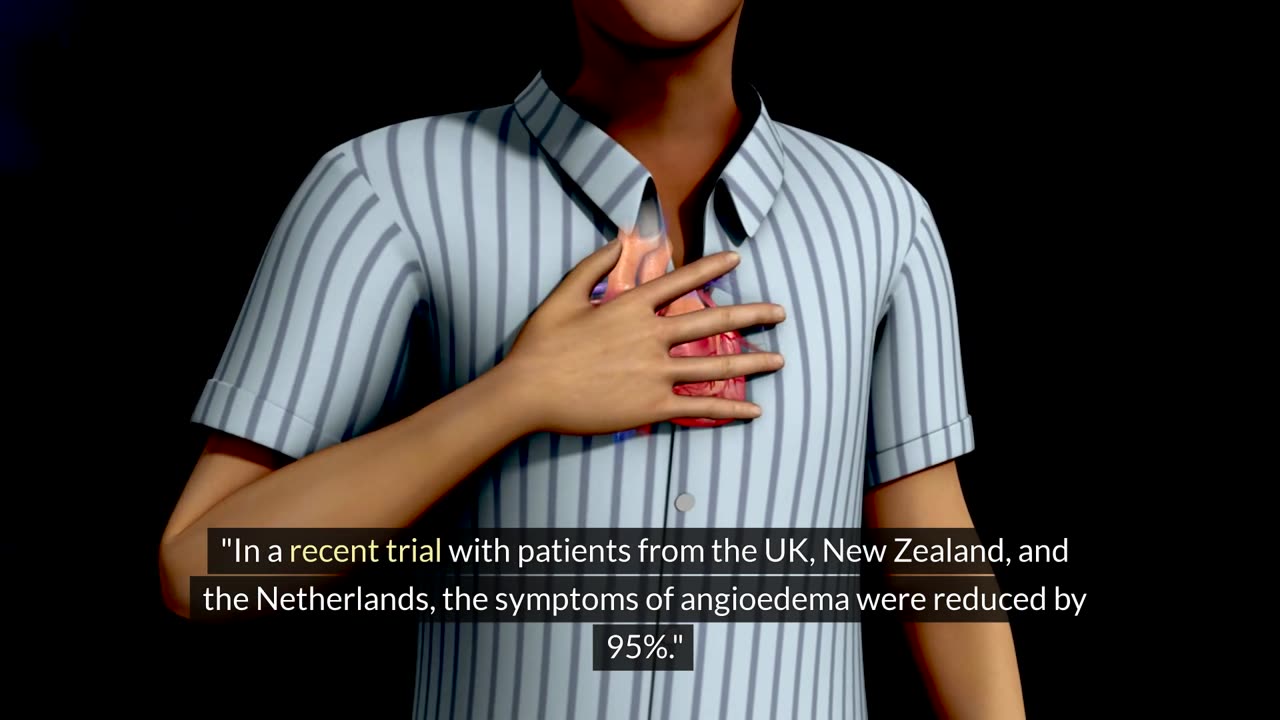Premium Only Content

"Revolutionary Breakthrough: Crispr Therapy Cures Angiodema and Holds Hope for Genetic Disorders"
In this groundbreaking video, we delve into the world of gene therapy and its revolutionary impact on treating angioedema, a painful and debilitating hereditary disorder. Through the power of Crispr therapy, scientists have discovered a way to specifically target and block single genes responsible for this condition, providing patients with a potential permanent cure. With an estimated 50,000 individuals worldwide affected by angioedema, this scientific breakthrough offers hope for a better future.
Angioedema is characterized by unpredictable and severe swelling attacks that can greatly affect the airways and even prove fatal. However, patients who received a single dose of the innovative Crispr-Cas9 gene therapy showed minimal signs of further symptoms. This remarkable treatment not only offers relief for angioedema patients but also represents a significant breakthrough in addressing various genetic conditions.
Dr. Hilary Longhurst, the principal investigator and a clinical immunologist at Auckland Hospital, emphasizes the potential of this single-dose therapy in permanently alleviating the disabling symptoms experienced by hereditary angioedema patients. The impact of angioedema extends beyond physical discomfort, as it often hinders daily activities and has a profound impact on mental well-being.
Through interviews with patients who have undergone the treatment, such as Cleveland Firman from Suffolk, UK, we gain insight into the life-changing effects of Crispr therapy. Previously burdened by the constant fear of severe attacks and disfiguring swellings, these patients now experience a newfound freedom, improved self-confidence, and a remarkable improvement in their overall well-being. The positive outcomes shown in this video highlight the promising future made possible through gene therapy.
Learn about Crispr-Cas9, a gene-editing system inspired by nature's DNA defense mechanism used by bacteria to combat viruses. Researchers have successfully adapted this system to target and remove faulty DNA in human cells responsible for causing illnesses. However, the process is not flawless, as edits may occasionally occur in unintended regions. Nevertheless, in a trial featured in the New England Journal of Medicine, a single infusion targeted at liver cells effectively reduced angioedema symptoms by an astonishing 95% among a select group of patients from the UK, New Zealand, and the Netherlands. Only one patient continued to experience minimal symptoms.
Dr. Padmalal Gurugama, who led the UK branch of this groundbreaking research at Cambridge University Hospital, emphasizes the significant potential this therapy holds in enhancing the lives of angioedema patients. By reducing severe swelling and intense pain, this therapy not only prevents life-threatening situations but also enables individuals to regain their ability to engage in normal activities, be it work, school, or pursuing personal passions.
Witness the profound impact of Crispr-based gene editing on angioedema, alongside its potential applications in treating various other genetic disorders. With numerous clinical trials showcasing similar promising results, the medical community is hopeful for a future where gene therapy becomes increasingly accessible and effective in transforming lives.
As the video concludes, it is highlighted that long-term safety and efficacy will be diligently monitored through a 15-year follow-up period for the patients involved in this groundbreaking study. Join us on this journey as we explore the path towards a future where Crispr therapy revolutionizes the treatment of genetic disorders, providing renewed hope and possibilities for countless individuals affected by angioedema and beyond.
-
 9:26:16
9:26:16
Dr Disrespect
10 hours ago🔴LIVE - DR DISRESPECT - WARZONE - PR ATTEMPTS
43K26 -
 LIVE
LIVE
Akademiks
1 hour agoDay 1/30. Lebron checks stephen a Smith. TOry Lanez talking CRAZY asf. Lil Ronnie K*Ilers Caught
2,983 watching -
 LIVE
LIVE
FreshandFit
2 hours agoCall-In Show
2,231 watching -
 4:27:46
4:27:46
Nerdrotic
6 hours ago $26.43 earnedDaredevil Born Again REVIEW, Harry Potter Show DOA, DC HACKED! | Friday Night Tights 344 Paul Chato
83.1K18 -
 1:15:15
1:15:15
Glenn Greenwald
3 hours agoWeek in Review: Lee Fang and Leighton Woodhouse on Ukraine War and NYT Piece Revealing Tensions within Trump Admin; PLUS: Lee Fang Takes Audience Questions on DOGE and Big Tech | SYSTEM UPDATE #420
26.2K24 -
 1:03:30
1:03:30
Sarah Westall
5 hours agoMassive Government Overhaul: FBI, CIA, IRS and more to be Gutted w/ Sam Anthony
24.5K7 -
 DVR
DVR
IsaacButterfield
5 hours agoAustralia Under Attack | Trump's State of the Union | All LGBTQ Cast (W Guest Frenchy)
6.07K -
 DVR
DVR
Edge of Wonder
5 hours agoIs Your Car Collecting Your Biodata? Whistleblower Exposes Dark Agenda
11.7K1 -
 DVR
DVR
Quite Frankly
7 hours ago"News Round-Up, Celebrity Stories, Friday Extras" ft. J Gulinello 3/7/25
19.7K5 -
 55:49
55:49
LFA TV
1 day agoGermany Started Two World Wars and Now Wants Nuclear Weapons | TRUMPET DAILY 3.7.25 7PM
20.6K18